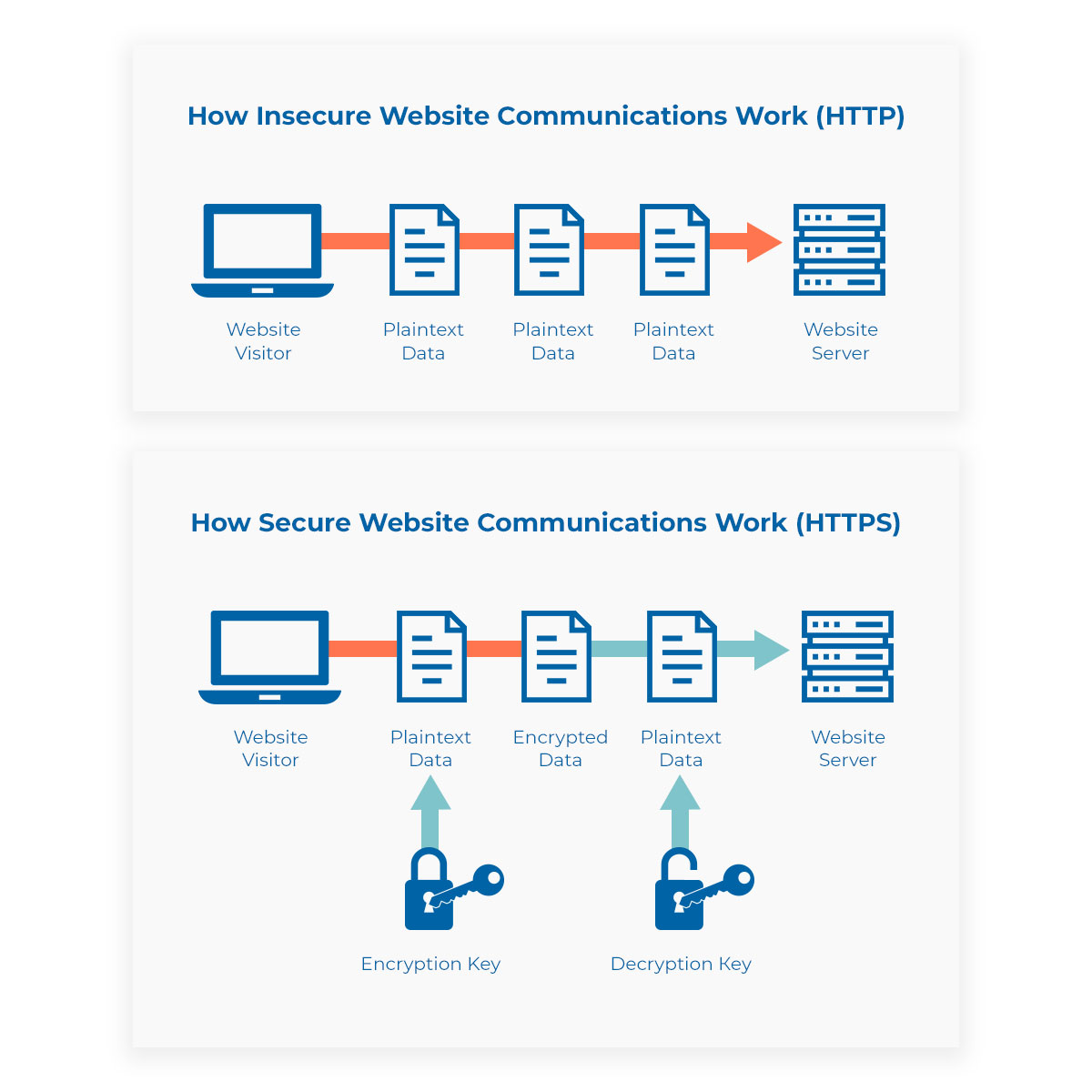As advances in technology continue, the ability for businesses to operate digitally becomes easier and far less manual. However, the more we rely on technology to meet our expectations, we often neglect to take appropriate precautions. While it’s crucial to keep up to date with the latest technology to stay relevant and to continue to thrive as a business, it’s also important to ensure our online data is well-protected.
In the past, it may have seemed optional to host your website securely, but today, it is crucial to have a secure website, both for your business and for your website users as well. If you haven’t made the switch from HTTP to HTTPS, now is the time to do so. What’s the difference? We’ll explain!
HTTP vs. HTTPS: What’s the Difference?

HTTP and HTTPS are two different protocols used for communication over the internet. HTTP, which stands for HyperText Transfer Protocol, is the older of the two and has been in use since 1991. HTTPS, which stands for HyperText Transfer Protocol Secure, is a more recent addition that provides extra security by encrypting data between a user’s computer and the webserver.
HTTP
HTTP is a stateless protocol, which means that each request is treated as independent from the others. This makes it less secure because a web server cannot remember which users have been authenticated and which haven't. HTTP is also less secure than HTTPS because it uses unencrypted communications. This means that anyone who can intercept the traffic between the user's computer and the webserver can see the data that is being sent.
HTTPS
HTTPS, on the other hand, is a stateful protocol. This means that each request is processed as part of a sequence, and the server can remember which users have been authenticated and which haven't. This makes HTTPS more secure because it reduces the risk of session hijacking attacks. HTTPS also uses encrypted communications, which means that the data is scrambled so that it can't be read by anyone who may be eavesdropping on the conversation.
Types of SSL/TLS Certificates Used with HTTPS
Secure Sockets Layer (SSL) is the name of the standard technology used to maintain a secure internet connection. It works by preventing criminals from accessing and potentially modifying sensitive or personal data transferred between two systems.
Transport Layer Security (TLS) is the updated version of SSL and is simply a newer, enhanced, and more secure version of SSL. Both SSL and TLS create an encrypted session between two computers on the web by verifying the identity of the server and preventing hackers from intercepting any data. The most current TLS version is TLS 1.3 and is more secure than any existing version of SSL.
There are three types of SSL/TLS Certificates available:
- Domain Validation (DV) – not recommended for use on commercial websites
- Organization Validation (OV) – standard for commercial/public-facing websites
- Extended Validation (EV) – offers the highest level of authentication
Why Switch to HTTPS?
Generally, companies that have made the leap to HTTPS, are those which intend to do everything that they can to improve their customers’ online security. The move from HTTP to HTTPS is a big step for an online business because it often involves migrating content managed by third parties, revising privacy policies and contact information, as well as configuring the website for HTTPS. The task can feel daunting, but it is a necessary step in order to ensure that your business is ready for the future of online communications.
Fortunately, there are many resources that can help you make the switch. For example, Google has created a guide that takes you through the entire process of making the move. Additionally, there are many companies that offer services related to HTTPS migration, such as HSTS Preloading and SSL Certificate installation. Smile MEDIA is happy to help you make the transition to HTTPS.
The biggest benefit of making the switch is that HTTPS provides a secure connection between your website and your customers’ browsers. This is important because it ensures that all data passed between the two is encrypted and can’t be intercepted by anyone else.
Thinking About Making the Switch?
If you are unsure about whether or not your business should make the switch to HTTPS, remember these points:
- HTTP is an insecure protocol that can be easily compromised by hackers.
- HTTPS is a more secure protocol that encrypts data between a user’s computer and the webserver.
- HTTPS is required for online businesses that want to ensure their customers’ security.
- The move from HTTP to HTTPS is a big step, but there are many resources available to help you make the switch.
According to Google’s Transparency Report, 56% of all website traffic on Chrome was encrypted by December 2016. By making the switch now, you are joining other businesses in keeping up with the times and showing your customers that you care about the security of their data.
Fortunately, many web hosting companies will even include SSL security for free (included with hosting costs). Depending on how much data you have to transfer and the timeline you choose, the switch from HTTP to HTTPS could take as long as several months. However, it will be worth it in the end, because your customers will know that they are protected when browsing your website.
So go ahead and educate yourself on how to make the move now so you can show off your new security measures to your customers and start receiving their appreciation in return. For best results, get in touch with Smile MEDIA today.










